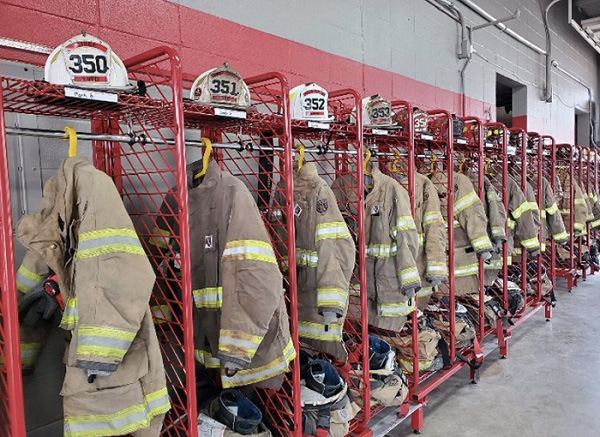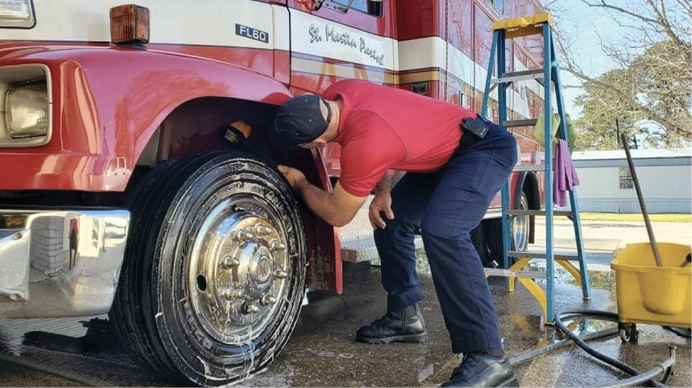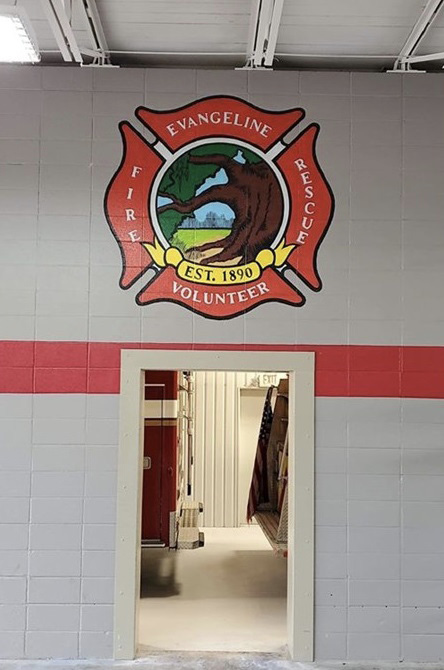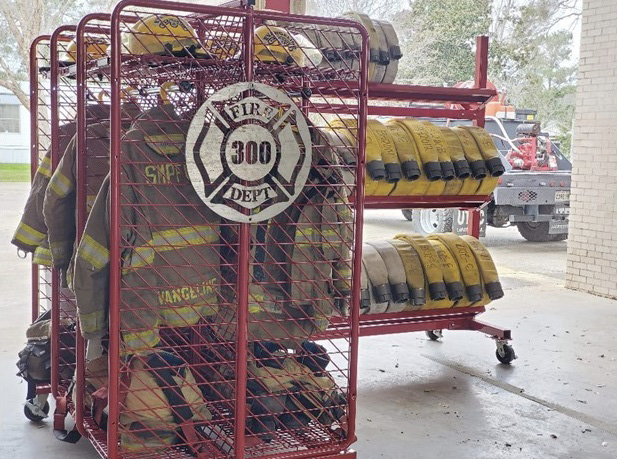VOLUNTEERS CORNER ❘ By DAVID DOUGET
The answer to what makes a successful department successful is pride. Many issues are plaguing the fire service across the country. For career departments, the problem is getting good firefighters to apply and then keeping them from quitting for a more lucrative job. For volunteer departments, the problem is getting people to volunteer. All too often, we hear of volunteer fire departments struggling to provide quality professional service. Usually, these departments face the following three issues:
- Operating in a small rural community.
- Operating out of an older station downtown.
- Having a definite need for volunteers.
The question that always comes up is, “How can we get good people to join?” Although this is a good question, it is often overlooked in lieu of what the fire department offers to the community. A department that is inactive will remain inactive, while a department that is always in the public eye will likely recruit members. The question here is how the department can be the latter. One way to ensure the community knows you are active, care about them and the service you provide, and are dedicated is by your ability to show pride in your fire department. Pride does not come from wearing your department’s T-shirt around town and to the grocery store; it comes from your ability to represent the department positively and bring a positive image and respectable service to the community you swore to serve.
RELATED
- Messaging for Volunteer Firefighter Recruitment
- The Staffing Dichotomy: Quality vs. Quantity
- Are You ‘Only’ a Volunteer Firefighter?
- The Professional Volunteer Fire Department: House Pride
Taking pride in your fire department becomes visible in different activities, events, and situations in which the department participates. However, remember that we are subject to scrutiny and opinions just as any other service provider. The public notices what we do, even if we think they don’t. They also notice the way we conduct ourselves around town. We must make it a point to be respectable firefighters for the community and always ask, “What kind of firefighter would I want responding to my house?” In addition, chiefs must always ask, “Is my department doing the best it can?”

(1) To be successful, you must start successful; organization is key. Having an organized station means that you are professional in your actions and assume a positive play for the public. (Photos by Mark Dupuis Jr.)
Maintaining a High Standard
Taking pride in your department is contagious and not hard to muster. You can ensure your department is held to a higher standard by doing the following:
Be “clean and shiny.” For example, make sure you wash the trucks on a regular basis. Your community pays taxes for everything you have, and they want to see it being maintained. The easiest way to give them peace of mind that their investments are taken care of can be as easy as letting them see a clean and polished apparatus drive past them on its way to help their neighbor. A dirty truck suggests that you don’t care about it, and they can then assume that you don’t care about them.
Keep the station “neat and tidy.” An eager citizen who stops by to fill out an application will not want to walk into a messy station or apparatus bay with old junk cluttering every corner, unorganized, and he will not want to give precious hours away from his family to a dysfunctional organization. Think about the time you entered somewhere and immediately criticized its appearance before you knew any facts. This is not a good first impression for your organization’s future firefighters.
Know that a little paint goes a long way. Maintaining your station’s appearance is a constant reminder to a potential volunteer that, although you do not see us, we are here. Although some fire stations are busy and turning out a call an hour, most are not; this means not everyone in your community sees the eight calls you ran last month. However, every time they drive by your station, they can see if their local fire department is active or not by the station’s general appearance. So, keep up the station, inside and out. Paint and brushes are cheap. Use one Saturday during the spring, and your station can look 20 years younger. Sometimes, just painting the apparatus bay can make it look neater. As the saying goes, “It’s amazing what a little paint can do!”
Be polite and courteous. There are two things to remember when dealing with the public:
- They are calling you on their worst day. They need emergency help, and they don’t care that you are missing the ninth inning of a nail-biting baseball game or you are trying to get the motor on your boat fixed to head to the lake for the weekend. They need you, and being rude because your day is busy is not going to make them more cooperative or make the call conclude any faster.
- The fire service has developed a level of distinguished respect over the years, so don’t ruin your department’s reputation by destroying the public’s trust. Remember, we are here for them.
Always train! Your community may not see the trucks running calls, it may never even step foot inside your station, but most will notice when the trucks are outside the station and firefighters are everywhere doing hose evolutions, ladder raises, or whatever you are training on. We owe the public a professional service, and we can only provide that service by training to be better. We can’t tell a parent, “We could’ve saved your child, but we missed a search class six years ago and didn’t know how to do it.”
Pride—for ourselves, our fire department, and our community—becomes relevant when you see what is happening around you. For example, a department in our area, the Evangeline Volunteer Fire Department (EVFD) in St. Martinville, Louisiana, changed its fire service culture with positive reinforcement. The EVFD took pride in itself through recent improvements to St. Martinville Central Station 1. Chief Mark Breaux and the EVFD worked hard over the past year to make their “second home” represent their passion for firefighting and love for their community. The station, constructed in 1967, was in no way an updated modern showpiece. However, they painted the station, added murals and new gear racks with department logos, and began a new direction with a vision of service and dedication as their core values to the St. Martinville community.
Although we look at the importance of pride, it is only one key factor toward a successful department; how we display our pride and dedication is equally important. We must always be respectful of the public and each other. Having honor and character is a perfect way to represent the pride in your department and the community, but it is more than that—we must make it a point to conduct ourselves every day, every shift, and every response to an emergency with dignity and professionalism.

(2) You can never clean a fire truck enough. As we take great pride in our departments, we must ensure that our most recognizable piece of equipment reflects that pride. Taking the time to ensure the task is done right goes a long way toward instilling confidence that everything you do is done right.
Firefighters
The most important tool on any fire scene is the firefighter, but you must earn your place among the “old members.” The old saying, “You gotta give respect to get it” is true, especially among volunteer organizations. With career departments, you will have completed an academy and learned the basic information, so the members know you can handle yourself. Volunteer organizations have a much more difficult time establishing basic firefighting essential information when they only meet once a week for three to four hours. Following are a few things to remember as a volunteer or career firefighter to let the rest of the department see your pride for the organization:
You have two ears and one mouth—use them! Like most of you, I was once a cocky, arrogant firefighter. One of the best pieces of advice I ever received came from a senior captain on another shift. One morning, the members of the shift with which I was working were conversing, and I felt it necessary to interject a question and an opinion. The captain looked at me and said, “Hey, you haven’t been here long enough to have an opinion.” I quickly took a back seat to the remaining conversation, but after years of always having that situation play in the back of my head, I admit that he was right. We are often too eager to offer opinions and solutions when we have very limited experience on the matter. Some young firefighters have only pulled a crosslay once or twice and then try to lecture someone on the proper shoulder-flip technique and roll pattern. One of the best ways to learn is by sitting there and listening. Ask a question if you don’t understand, but don’t try to explain the basics to seasoned firefighters who have been doing it for 25-plus years. Trust me, they know what the “book” says.
Learn one craft before jumping to another. This is a hard one for most people. I talk to firefighters all the time who have barely performed a task correctly and are then ready to move to advanced ops. Recently, I told a firefighter, “You can barely tie that knot, and you want to be sent to a high-angle rescue class?” We can get comfortable quickly, and when you combine that with an eager leaner who catches on quickly, he can jump ahead too quickly. We must remember to master our craft.
Company Officers
Although we all assume that we are ready for the “color wheel of helmets,” sometimes we need to be reminded of where we started. We always assume we are holding the department to a high standard; although that may be true, we must ask if we are ensuring that our departmental pride is being held to the same standard. Company officers have one of the most important roles to play on emergency scenes and in firehouses; their representation of departmental pride affects the whole organization. As either a lieutenant or captain, you set the tempo for the firehouse through shiftwork, drills, company training, or anytime people are in the firehouse. Too many times, I have seen a company officer negatively commenting on his firefighters, who are a direct reflection of him. A lazy officer will have lazy firefighters. To all of my volunteer of career officers, listen up, and consider the following:
You are being judged. Although you may not expect to hear that, it is true for every day of your firefighting career. Whether you are volunteer or career, your department is criticizing every action you take and decision you make as long as your hold that rank and title, which is a good thing because your attitude is contagious. Walking into your station with a positive attitude every day will start to turn around even your most negative firefighter. The firehouse is watching every move you make, and your actions will be reflected in their actions.
You can tell a good officer by looking at the turnout gear when you enter the station. Seeing that officers’ gear is placed for their next call, the firefighters will follow and line up theirs as well. This even goes as far as their appearance and how they wear their uniform, which leads to the next subject.

(3) The mural our members see as they walk into our station for their shift. If your station does not show who you are as a department, how can you expect members to feel the same on a daily basis? Allow your station to resonate with your department’s personality and watch members’ personalities come to life.
Respect the uniform. Many times, I have witnessed officers complain about their firefighters’ attitudes, and it will always circle back to their uniform. Normally, when this happens, a quick look at that officer’s appearance will tell you all you need to know. If that officer’s uniform is wrinkled, the brass is tarnished, and the boots aren’t polished, how can you expect your firefighters’ uniforms to be any different? Your firefighters will mimic your behavior, especially during their first couple of years. If they see you polishing your brass and shining your boots, they will take a seat and follow your lead. Regardless of your uniform policies, never disrespect your uniform. The symbol on your sleeve or embroidered to your shirt represents years of dedication and sacrifice from those who came before you. That badge on your chest symbolizes centuries of firefighters who fought and died serving those they swore to protect. The helmet is the epitome of the American fire service; if you wear them all proudly and with respect, our firefighters will as well. This means your uniforms must always be ironed and pressed; your collar pins, nameplates, and badges are always polished and shiny; your boots are shined for every shift; and your gear and trucks are clean and ready for action.
Chief Officers
No matter who you are, no department will be successful unless the chief officers are prominent and involved. The best company officers with excellent firefighters will still be hindered by failed leadership from the chief officers. Whether the membership is volunteer or career, the chief is a pivotal role that must be played.
People think that volunteer chiefs have a much tougher time managing departments. Although this can be a true statement, the career chief has many more struggles of his own. When we arrive at large combination departments, we will have chiefs who deal with career staffing, volunteer commitment, and all the other chief issues (i.e., budget, board members, disgruntled employees, and so on). All chiefs are dealing with similar issues, and you are not alone in your stress to remedy a solution.

(4) Taking pride in your community means never being afraid to leave your mark. Reflect this pride with your department logo, always promoting a positive image.
Put the firefighter back in firefighter and the firehouse back in firehouse. In my opinion, no greater statement has been written when it comes to solving morale issues. Too many times, I have heard firefighters of company officers complain about their “policy-happy” chief. Suffice it to say, members do not need more policies for which to get written up; they need leadership from the top. Your people know right and wrong, but if they feel unimportant, they will do whatever they want, regardless of the consequences.
Micromanaging your department leads your officers to believe that you do not have confidence in their abilities. Let your captains and lieutenants manage their companies and houses, and if they make a mistake, it is just that—a mistake; no one is perfect. However, controlling your entire operation with an overabundance of policies will start to degrade morale and lead to problems. Firefighters will be firefighters, and we must let them do their job. No one likes to have their boss watch over their back all day for everything they do; we must trust our people.
We all remember the time when we were in that position and the dumb things we did, the goofing off, and the horseplay. It is okay to let them blow off some steam every now and again. If you must create policy to govern what time they can watch TV or play basketball around the station, then your problem is not with your firefighters—it is with their supervisors and leaders. When was the last time you asked your members about problems they had with their shift, station, or department? When was the last time you saw their families around the station? I do not understand why some chiefs insist that families not be allowed at a fire station. Remember, it is a firehouse; it is their home, too. We are chiefs and leaders, not dictators. Our pride in our department must be from its success, and its success comes from positive attitudes of firefighters who want to be there.
It’s lonely at the top. We have all been in the position where we had friends in the firehouse until we received a promotion and then they did not want to talk to us anymore, hang out, or watch a football game, and the family camping trips seemed to be less frequent. There is a simple explanation: You are their boss now. Think about some of the jobs you had—would you want to hang out with your boss all the time? Some chiefs have maintained great friendships with their subordinates after a promotion; some have not. Again, do not be a dictator; you need your members to perform their duties, but nowhere does it say they have to like you. We do not want to “rule with an iron fist,” but we must also be firm in our expectations and consistent with disciplinary measures. Worrying about friendships over the greater goal is what gets departments in a state of decline, bringing us to the next point.
This is a business; we can be friends after we leave. I have seen too many friends who are more worried about their members liking them than running a successful department. Why can’t they like and respect you and still do their jobs accordingly? This problem comes from chiefs who have a complex with authority. I have never had to threaten my members with write-ups for missed shifts or close the door for a screaming match. Never let your department pride turn into ego, and never use your rank as an excuse to have something done. If you need to point to your collar pins to have something done, you need to reexamine your leadership tactics. Your people know who the district, assistant, or chief is, and they don’t need you to remind them every five minutes. You need to tend to firehouse business, handle discipline, and give orders and, if done correctly, you can meet up for a drink and catch a ballgame when you leave the firehouse or after the shift ends.
Market your mission and promote your department. I will never understand why chiefs fail to even attempt to market their departments. By this, I do not mean pay for a state-of-the-art Web site and hire a firm for public relations (PR) management; I am talking about basic social media and PR.
One of the easiest ways to promote your department is to be active on social media. Although one of the chief’s primary jobs focuses on maintaining Insurance Services Office (ISO) ratings, why do we fail to market our success? In Louisiana, our ISO ratings are determined by the Property Insurance Association of Louisiana. In addition, my department, the Iota (LA) Volunteer Fire Department, has maintained a Class 3 rating since 2003, and we are proud to say so. This past year, we made sure our citizens noticed, too.
Another cost-effective way we marketed our mission and advertised our department was by adding a few new decals to one of our trucks. ISO ratings aside, representing your department positively is another part of your job description.
As officers, sometimes the hardest thing to hear is that we are failing at our duties. We like to think that we are doing what needs to be done and our way of handling the situation was the best way to do so. I instruct my officers to always self-reflect on what is happening around them. Look at your own actions and see how they are being received by your people. Ask yourself, “Am I doing this right?” Sometimes we need to ask someone else—am I giving my truck, station, and battalion what they need to be successful? Sometimes the answer is no, and that is okay. Our departments will only be as successful as we let them be. I encourage officers to sit down with their people and ask them not only what issues bother them but also what they need from that officer. You may be amazed by the answers you receive.
When we consider what it takes to run a fire department successfully, remember to promote ourselves positively. In the case of the St. Martinville station, look at that department’s positive image being broadcasted into their community. Showing pride in your department becomes showing pride in your community, and a community that knows you love and have pride for them returns it to your organization tenfold.
Make sure to display your appreciation and dedication for your homes and communities and recognize our message of life safety and property conservation as well as our dedication to the public. As a service profession, we must be at our best every day. We look at recruitment and retention problems across the country and ask ourselves how to fix the problem. We cannot fix this problem overnight, but we can start down the right path, and that path begins with pride. Although we can’t force people to become firefighters or join our organization, we can show them that we are dedicated, professional, and ready to serve them in their time of need.
DAVID DOUGET is a training officer for the St. Martin Parish (LA) Fire District and the chief of the Iota (LA) Volunteer Fire Department.

